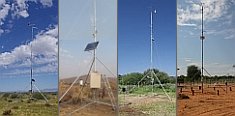|
|||||||||||||
 |



Weather data

A large number of automatic weather stations has been implemented in the frame of the BIOTA AFRICA project by the Namibian National Botanical Research Institute (NBRI) and the Group "Biodiversity, Evolution and Ecology" (BEE) of the University of Hamburg. The website offers hourly updates of data and graphs of a large number of weather parameters.

|
TOWARDS SUSTAINABLE USE OF BIODIVERSITY Cooperative research of African and German scientists for the generation of policy relevant knowledge on maintenance and sustainable use of biodiversity The goal of BIOTA Southern Africa is to gain knowledge for decision makers for a feasible and sustainable management of biodiversity, by taking natural as well as socio-economic conditions into account. This interdisciplinary and applied research project concentrates on studies in Namibia and the western parts of South Africa. Since start of the pilot phase (2000), the investigation focuses on the change of biodiversity caused by different land use systems and intensities. Therefore, systematic comparative studies on land use alternatives at different thematic levels and spatial scales have been established. During the pilot phase (2000-2003), research on abiotic conditions as well as basic information on the existing biodiversity and its properties, patterns and function has been carried out as a prerequisite for understanding the natural framework of organismic diversity. This included the assessment of pedo- and geodiversity, climate, large-scale landscape structure, biological soil crusts, diversity of vascular plants and of various animal groups and their functional network. The main focus of the second phase (2004-2006), is to understand the drivers and mechanisms of changes in biodiversity as a base for scientifically sound predictions and interventions. The research activities are concentrated on the 35 standardized long-term monitoring sites, Biodiversity Observatories, along the BIOTA Southern Africa transect.
The achieved findings on natural biotic dynamics within ecosystems as well as on changes of the economic utilization patterns and related consequences for biodiversity and socio-economic productivity will be transformed into prognostic scenarios using modelling techniques. Based on this information, decision making tools for the land users, for the public, for politicians and for local policy makers as well as for international conventions will be generated. |
 Go to the WeatherNet
Go to the WeatherNet